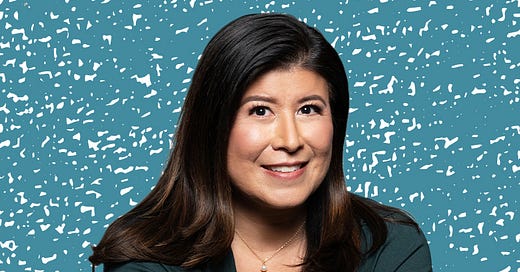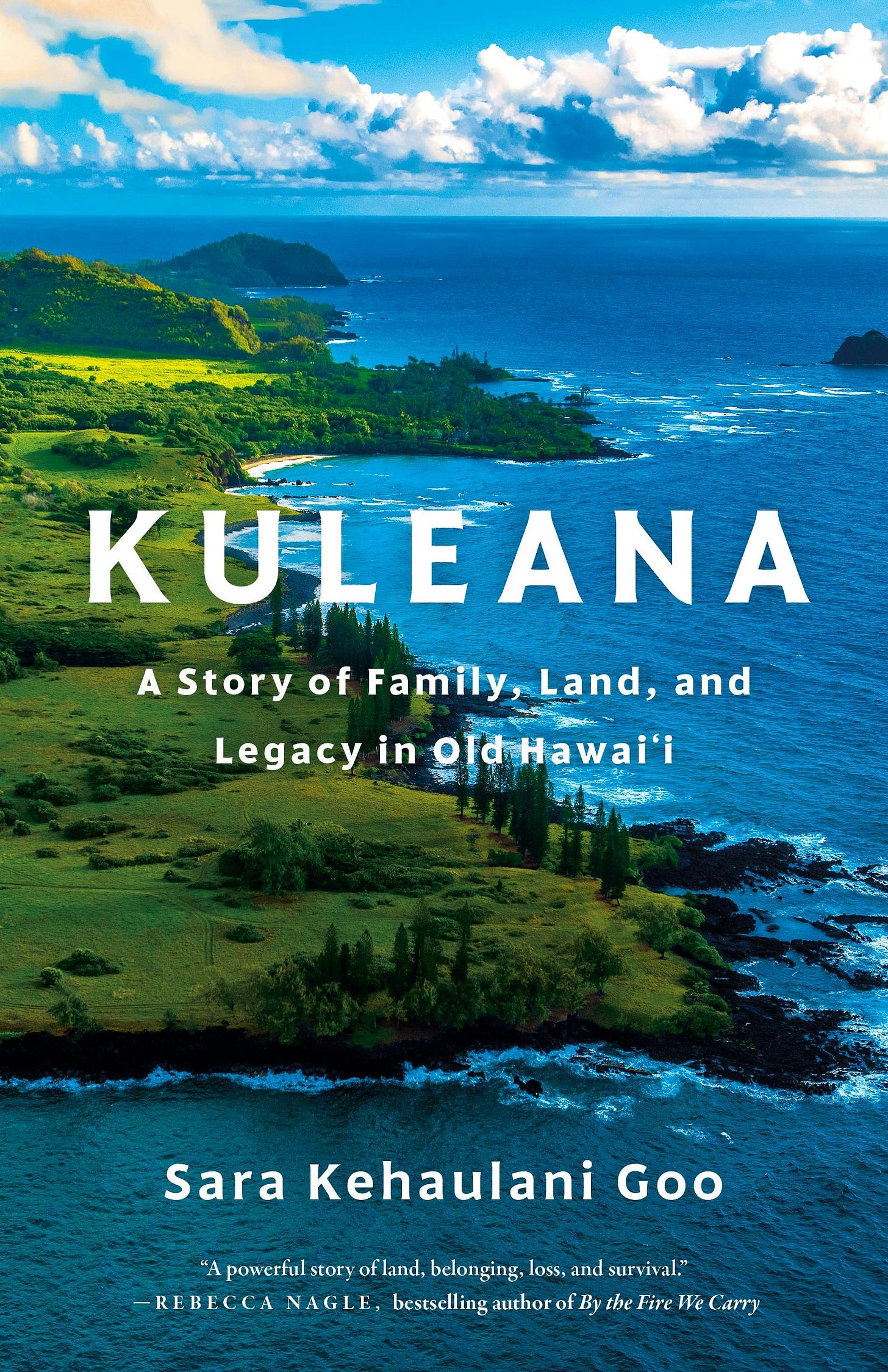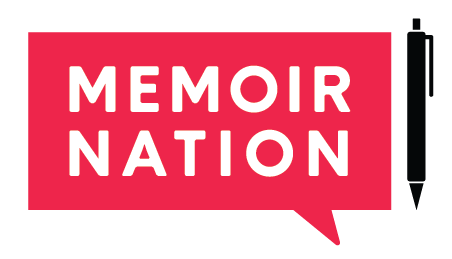Sara Kehaulani Goo is a journalist and senior news executive who has led several news organizations including Axios, NPR and The Washington Post. She is the former editor-in-chief at Axios, where she launched the company’s editorial expansion into national and local newsletters, podcasts and live journalism. Before Axios, she led online audience growth as a managing editor at NPR, overseeing the newsroom's digital news operation. Sara lives in Washington, D.C. Her new book is Kuleana: A Story of Family, Land, and Legacy in Old Hawai’i.
Transcript from the show
Brooke: Dear legacy holders and lineage bearers, historians and journalists and family reporters. I’m Brooke Warner, here with Grant Faulkner on another episode of Memoir Nation. Grant, it’s turning summer this week, so happy summer, everyone. Because we live in California, a lot of people go to Hawaii in the summer. Very popular tourist destination, obviously. You were on Oahu earlier this year, Grant, teaching for our friend Connie Hale’s writing retreat, and I was there in November on Kauai for the Kauai Writers Conference, and I was on Maui, about two weeks before the devastating fires a couple summers ago. Hawaii is known for its beauty and its popularity as one of the most sought-out destinations probably in the world, but it’s got this very complicated and tragic history of exploitation and land theft and subjugation. And I was struck when I was in Maui last by all the signage I saw, a lot of them that said “Locals only—keep out.” Some of those signs were overtly about land and keeping the land for Native Hawaiians. And the reason I bring up this darker side of Hawaii’s history, and land grabs, and Native Hawaiians’ more visible efforts to assert their claim to their land and their rights is because this is at the heart of our guests, Sara Kehaulani Goo’s new memoir, Kuleana—A Story of Family, Land, and Legacy in Old Hawaii. I’m curious, Grant, if you experienced or saw any signs like this when you were there, or had a chance to think about some of these more challenging histories that are so much a part of Hawaii’s legacy?
Grant: Yes, definitely, there were a variety of different signs like that, advocating for Hawaiian sovereignty and independence. One thing that was significant about the retreat I taught at is that it wasn’t about being at a luxury hotel on the beach that’s removed from the land and the people, White Lotus style, but since Connie grew up in Hawaii, she worked hard to bring Hawaii into the retreat through a variety of cultural experiences and field trips. It all inspired me to learn more about Hawaii’s history because I have to confess that I don’t know much about it. I did encounter the word Kuleana, though, and I loved its meaning.
Brooke: I want to set up a bit what Sara’s book is about here to give context for its title, Kuleana. Kuleana translates as “responsibility,” but the concept is much deeper than that for Native Hawaiians. Sara points out in her book that it’s not the kind of responsibility that’s a burden, but rather an honor and a privilege. Kuleana is stewardship—and so it’s the way you protect and honor, and while land is a huge piece of that for Native Hawaiians, kuleana is also practiced in the form of caring for and honoring Family & Community, culture and identity, and the environment. But Sara does something really beautiful in this book, and weaves the notion that kuleana is also story—specifically this kind of story. Specifically memoir. The journey of her book is to protect and keep in the family this large acreage of family land that has been passed down through the generations from the family’s original ancestor, who was gifted the land by King Kamehameha III in 1848. And her family has been stewards of this land ever since. But of course it’s coming to head here for Sara’s generation, in part because it’s undeveloped, and the US government decides, out of nowhere, to raise the taxes—to a degree that the family worries about how long it will be able to hold on.
And Grant, some of the rules about Hawaiian land ownership and how you’re allowed to pass down land are truly insane. There’s a rule on the books about inheriting land that stipulates that you have to be one-fourth Native Hawaiian. And while this might have originally been written as a way to protect Native Hawaiian land and families, through the generations people are losing their land because their not having babies that meet the native blood rules. There’s a whole host of these kinds of laws, in fact, that have resulted in dispossession, stripping Native Hawaiians of their land. And Sara tells a personal family story that shows that all of this is very alive and well right now, in 2025.
Grant: I talked with a person who comes from a long line of Hawaiians who had a similar story. It’s tragic and eye-opening to read about the history not only of dispossession, as you mentioned, Brooke, but also the legal restructuring and bureaucratic control that’s been exerted on Hawaii by the US government. Basically land-related policies and systems that were explicitly designed to make it difficult for them to reclaim, retain, or access land, starting with The Kuleana Act of 1850, which Sara writes about in her book, which was intended to grant land rights to Native Hawaiian commoners, but ended up dispossessing them in many cases because of its strict requirements to file land claims within a two-year window and to prove that they were cultivating the land, oftentimes when this land is wild jungle that grows like crazy and can be very hard to maintain in Hawaii’s tropical climate.
I think readers are going to get so much out of this memoir, truly, and it should be required reading for anyone going to Hawaii, but also for anyone. I know I wanted a book like this the two times I’ve visited because I felt woefully ignorant. Certainly we are seeing land grabs and dispossession elsewhere in the world right now, tragically. And so none of this stuff is of the past. We really are a terrible scarcity-driven species.
Brooke: Yeah, isn’t that true. Sara draws many direct parallels between Native Hawaiians and Native Americans. And her book is about much more than the history and the story of her family’s land. It’s also about this hugely important idea of kuleana—and at one point she writes about how her story and her book are her kuleana. She writes, too, about her hula teacher, and how he tells her that his kuleana is to teach hula. In fact, this is a beautiful part of the book where Sara decides to learn hula, and her teacher says to her: “Hula is not a dance. It’s storytelling. It’s an oral history put to movement, it’s how we passed down things from generation to generation . . .” And for me, this entire reframing of what hula is symbolic of the many ways that American culture simplifies things, takes the spirit and meaning out of things. The point here is that too many people see hula as just a dance, much like they see Hawaii as just a postcard pretty vacation spot. But look deeper, and you’ll see, it’s so much more.
Grant: Exactly, Brooke, that’s the perfect way to put it. We’ve put Hawaii on a postcard, so much so that it’s difficult for tourists to know or see the true Hawaii. I actually watched the annual hula competition, which was just amazing, while I was there. I love this notion of writing as Kuleana, because I think a lot of people feel this way about their work—and I agree that in this context, especially memoirists. When you’re writing a memoir, you often are being the steward of your story. Because who’s going to tell it if you don’t? If you are serious about your writing, you are responsible to it in all the ways Sara writers about—as an honor, as a privilege, as something you will pass down. I think when we talk about purpose, when we talk about your “why”, we can think about this word, Kuleana. It is those things. When the word was explained to me, it held the sacred, the divine, as well. Something very deep. So it is your why—and perhaps a good exercise would be to write down the ways in which your book, your story, is your kuleana, and see what emerges. I always say that it’s important to locate your why in writing because it will not only make you braver on the page, it will get you through the dark times.
Brooke: Love that, Grant—and I’m so excited to talk to Sara Goo about her new book. Sara and I have been friends since elementary school, and we’ve been tight all these years—really especially since middle school. And she’s one of the friends I went to Iceland with recently, so I’ve been on the journey of this book for a long long time, and I’m truly proud to know this woman and to be a champion of her beautiful book, which I hope our readers will read and love as much as I do. We’ll be right back after this short break with Sara Goo.
In our weekly subscriber newsletter
In this week's Memoir Nation subscriber newsletter, Grant takes inspiration from Bill Murray’s famous “It just doesn’t matter” speech from the movie Meatballs, when he gives a rousing and ironic pep talk to the underdogs at Camp North Star before their competition with the wealthy Camp Mohawk.
It's a paradox of creativity and life: Sometimes you have to tell yourself it just doesn’t matter, and that can create momentum to sit down and write what matters: your story."
Watch Bill Murray’s speech for inspiration!
Interested in more memoir content? Join Path #2 or #3 to get our weekly newsletter at www.memoirnation.com.
About Memoir Nation
Memoir Nation is a hub and a community for writers, legacy-builders, published authors, and memoir enthusiasts.
Whether you’ve lived twenty years or eighty years, you’ve lived a life rich with stories that are calling out to be told.
So many people say, “I’m going to write my story someday,” but “someday” tends to always be off in the distance. Memoir Nation is here to help you start writing your story today.
Memoir Nation provides the inspiration, guidance, structure, and support to equip you creatively, emotionally, and psychologically to write your life story.








